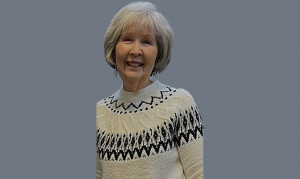I visited my parents’ graves a few months back. Dad, William E. Epps, Jr. (“Bill” to his friends and “Junior” to his siblings), died in 1996, and Mom (Thelma Kathleen Luster Epps) followed him about six years later. Dad served in the United States Navy during the waning days of World War II and his service is indicated on his marker at Oak Hill Memorial Park.
A few years ago, I started taking an American flag with me when I visited the graves and placing it on Dad’s grave. It was my way of continuing to demonstrate honor to my father.
Usually, the flag would need to be replaced. Sometimes, the weather would have taken a toll on the flag and at other times it was just missing. Sometimes my visits are months apart since my folks are buried in Kingsport, Tenn., just a few miles from the Virginia state line, and I live some 360 miles to the south and slightly west.
On this particular visit, I had my new American flag with me and, as I approached the grave, the flag I had placed on my previous visit was still in good shape and was flying proudly. Next to my parents’ graves lie the graves of my maternal grandparents.
Actually, reposing there are my grandmother, Pashia Tunnell Luster Duckett, and my step-grandfather, Charles Daniel Duckett. My biological grandfather, Roy Luster, died at the age of 26 of a fever that would have been only a nuisance a few years later but was fatal in his day. He left a widow and three small daughters.
Charles, as the girls (Blanche, Ruby, and my mom) would always call him, the man I would forever know as “Grandpa,” came upon the scene sometime later and met and married my grandmother. Of the adults who would be influential in my life, he was at the very top. Grandpa didn’t have a flag on his grave. Too young for World War I and too old for World War II, he never served in the military. By protocol, he didn’t rate a flag.
A visit to the graves always brings in a flood of memories. It’s one of the reasons I visit. It’s also a place to make peace. Like most deaths, my parents’ passing left unresolved issues. My family did not talk about feelings or intimate things very often. I guess in their generation, it wasn’t the thing to do — especially with the children. When I would visit them in previous years, my closing conversation with my dad went something like this:
Dad: “I always have so many things I want to say to you when you’re away and, now that you’re here …” as his voice drifted off into silence.
Me: “I know, Dad. I understand. It’s okay.”
Dad: a smile and a head nod.
So, I climb the hill and say things to them both that should have been but were never said. Afterwards, I ask God to relay the message if He wouldn’t mind. I don’t know how theologically sound that is, but somehow I feel better for it.
On the last visit, I lingered for a time at my grandfather’s grave. I imagined the difficulties of raising three step-daughters in a Depression and post-Depression era. I knew he often had to travel from Tennessee to South Carolina for work and I knew that sometimes he earned only a dollar a day back when the days were extremely long and arduous.
He became a pipefitter by trade, a blue-collar working man who kept a roof and a full pantry by sweating during every warm day and freezing on every cold day. Later, for his grandchildren, he would become a baiter of hooks and a farmer of worms and night crawlers.
When my dad was laid off and out of work for 18 months in the days before safety nets, he would slip my mother some money behind the back of my very proud father who thought that accepting charity was unmanly and a sign of weakness.
When I graduated from Marine Corps boot camp, he was the first member of my family to see me in uniform and, when he died in 1973, his funeral was the last time I wore my dress greens.
As the memories flooded back, I recalled that, on that day in 1973, after the final prayers had been said and after I told my wife to take our infant son and my younger brother to the car, I had stayed alone for a time at his grave.
In spite of wearing the uniform and trying to be disciplined, the tears began to roll. Eventually, I sank to my knees and sobbed. Such was the hole his departure had left in my life.
Now, here I was again, 40 years later, standing in that same spot. I didn’t cry this time. This time the memories brought a smile and the satisfaction of warm memories. And then I broke protocol.
I decided that a man who had done what Grandpa had done for three little girls and a young widow, what he had done for his grandchildren that he had never seen as “step,” and the hard years of work that he had contributed to his community and nation were all worth something.
I put the extra flag on his grave.
This week I return home for another funeral. Somewhere during that busy time, I will make a solitary journey back to the top of the hill where the four graves lie under the warm Tennessee sun. This time I will be taking two flags.
[David Epps is the pastor of the Cathedral of Christ the King, 4881 Hwy. 34 E., Sharpsburg, GA 30277. Services are held Sundays at 8:30 and 10 a.m. (www.ctkcec.org). He is the bishop of the Mid-South Diocese which consists of Georgia and Tennessee (www.midsouthdiocese.org). He may contacted at [email protected].]












Leave a Comment
You must be logged in to post a comment.